Michelle Irwin's Blog: Write On Shell, page 14
May 3, 2014
Location, Location, Location
When you're buying (or even renting) a house, you'll often hear that it's all about location, location, location and that's true. Your proximity to shops, schools, extracurricular activities, restaurants, bars, crack dens, brothels etc etc all change the way you will live and the way you enjoy, or indeed may not enjoy, your home. I think the same can be said for the setting of your story.
If you are writing a book about vampires who are sensitive to the sun (or indeed burst into flames in direct sunlight) it probably isn't a good idea to set it somewhere like where I live in Queensland, Australia. It is sunny here more often than not; even in the depths of winter we rarely see a day that has complete cloud cover and not even a hint of sun. Although, now that I've written that little paragraph, it does sound like a fun idea to write about a vampire trying to deal with the challenges such a perpetually sunny place offers. Maybe it's better to use the abominable snowman as a bad idea to set in hot ol' Queensland. It is possible, it could even provide some unique challenges for your character to face, but unless it's done just right the reader will soon be rolling their eyes and muttering "Yeah right," under their breath.
In my debut novel, and the series that follows, my characters aren't really based anywhere although most of the story is set in the US. There are many and varied reasons for this decision, primarily because it just felt "right" for them to be American. I don't think they would be the same characters if they were based in Australia. That's not to say I won't write characters set in Australia, in fact one of my early-stage WIPs is set in the outback, but I won't say too much just in case it never sees the light of day.
Another element to where they story is set is how the characters interact with that setting. my character's aren't necessarily firmly grounded in any particular area. The reason for this is that in my mind, the ungrounded feel of the story suits the characters. They're not the sort to taste the local wine and embed roots deep in an area, they are the sort who do what they need to survive and that doesn't necessarily include stopping to find out where the local Walmart\Teslcos\Woolworths\<insert relevant shop name here> is. That doesn't mean that I haven't done as much research as possible about all the various places they travel. In fact, I've spent many a night walking virtual roads on Google maps and the like.
On the flip side, I'm reading a book that is set heavily in one particular town. It's described in such detail that I could probably stand a good chance of mapping it out, maybe even with my eyes closed. I could describe the textures of the bricks and the colour of the paint. For some, this level of detail is probably heaven. Personally, I find it a little indulgent and am ready to read on with what comes next in the story and despite this it fits with the main character. He's a character who notices the small details in life and who is in love with his small town--or at very least doesn't want to leave it. (NB: I'm only on the first of the series so maybe he does end up leaving later on, but if he does it hasn't happened yet).
I guess what I'm saying, in a roundabout sort of way, is that setting is a great chance for characters to grow from cardboard cut-outs to fully fleshed people. In real life, some people go through life stopping to take note of every brick on the sidewalk, others barely know which city they're walking in.
Taking the character element out of it for a moment, I'm curious about what sort of setting detail you like to see: one steeped in lots of detail, to the point where you feel as if you could find your way through the town on your first time visit without any extra guidance; or one where the setting is a background that you barely notice as you move through the story? Maybe somewhere in between?
And one more question, do you like to travel the world when you read or do you usually pick a story set closer to home?

If you are writing a book about vampires who are sensitive to the sun (or indeed burst into flames in direct sunlight) it probably isn't a good idea to set it somewhere like where I live in Queensland, Australia. It is sunny here more often than not; even in the depths of winter we rarely see a day that has complete cloud cover and not even a hint of sun. Although, now that I've written that little paragraph, it does sound like a fun idea to write about a vampire trying to deal with the challenges such a perpetually sunny place offers. Maybe it's better to use the abominable snowman as a bad idea to set in hot ol' Queensland. It is possible, it could even provide some unique challenges for your character to face, but unless it's done just right the reader will soon be rolling their eyes and muttering "Yeah right," under their breath.
In my debut novel, and the series that follows, my characters aren't really based anywhere although most of the story is set in the US. There are many and varied reasons for this decision, primarily because it just felt "right" for them to be American. I don't think they would be the same characters if they were based in Australia. That's not to say I won't write characters set in Australia, in fact one of my early-stage WIPs is set in the outback, but I won't say too much just in case it never sees the light of day.
Another element to where they story is set is how the characters interact with that setting. my character's aren't necessarily firmly grounded in any particular area. The reason for this is that in my mind, the ungrounded feel of the story suits the characters. They're not the sort to taste the local wine and embed roots deep in an area, they are the sort who do what they need to survive and that doesn't necessarily include stopping to find out where the local Walmart\Teslcos\Woolworths\<insert relevant shop name here> is. That doesn't mean that I haven't done as much research as possible about all the various places they travel. In fact, I've spent many a night walking virtual roads on Google maps and the like.
On the flip side, I'm reading a book that is set heavily in one particular town. It's described in such detail that I could probably stand a good chance of mapping it out, maybe even with my eyes closed. I could describe the textures of the bricks and the colour of the paint. For some, this level of detail is probably heaven. Personally, I find it a little indulgent and am ready to read on with what comes next in the story and despite this it fits with the main character. He's a character who notices the small details in life and who is in love with his small town--or at very least doesn't want to leave it. (NB: I'm only on the first of the series so maybe he does end up leaving later on, but if he does it hasn't happened yet).
I guess what I'm saying, in a roundabout sort of way, is that setting is a great chance for characters to grow from cardboard cut-outs to fully fleshed people. In real life, some people go through life stopping to take note of every brick on the sidewalk, others barely know which city they're walking in.
Taking the character element out of it for a moment, I'm curious about what sort of setting detail you like to see: one steeped in lots of detail, to the point where you feel as if you could find your way through the town on your first time visit without any extra guidance; or one where the setting is a background that you barely notice as you move through the story? Maybe somewhere in between?
And one more question, do you like to travel the world when you read or do you usually pick a story set closer to home?

Published on May 03, 2014 01:53
April 21, 2014
Trials and Tears
After finishing a book, I was reading the reviews for it and found one that was complaining about the number of times the main male character cried. I think I remember it happening three times in 300-odd pages, maybe it was more than that but if it was I didn't notice it. Of the three times I remember, I didn't personally think any of the instances of tears were unrealistic. The circumstances were all ones under which I would expect most people to be upset and possibly shed a tear.
However, this review got me thinking about men crying (in written fiction, in real life and on TV). The reviewer said nothing of the number of times the female main character cried (which was at least as often--in fact I think it was more). I have to wonder why? Is it part of the general perception that men are expected to be "strong"? I can't really answer that because I don't know what was going on in the reviewers mind when s/he said that it made them roll their eyes every time it mentioned the male crying.
Personally, I find it a sign of strength in a man that he is willing to allow his emotions to show. And you will never be able to convince me that alone, in their darkest moments, men don't feel the same things that women do. That men aren't willing to give themselves over to sorrow when they are grieving. And by grieving I don't necessarily mean the loss of a loved one (although there is that too) but it might be the loss of a relationship, facing the realization that something expected and anticipated isn't going to come to fruition, or even having lost of control over some key aspect of his life. These are all, in my opinion, reasonable reasons for a man to cry.
Yet even with this belief, I have to admit I find it more confronting to watch a man breakdown in tears than to see a woman cry. Although it didn't make me roll my eyes, I did notice when the male character cried much more than I noticed whether the female did. Maybe this is linked to the same societal prejudice against male emotions that could have been part of the reason for reviewer's remarks. Maybe it's more reason why men should cry in fiction--to show that a man who cries isn't automatically a weak man.
What are your thoughts on this issue? Should men be allowed to cry in novels or does it make you roll your eyes too? Or does it depend on the situation? If that's the case, under what circumstances do you think it's okay?
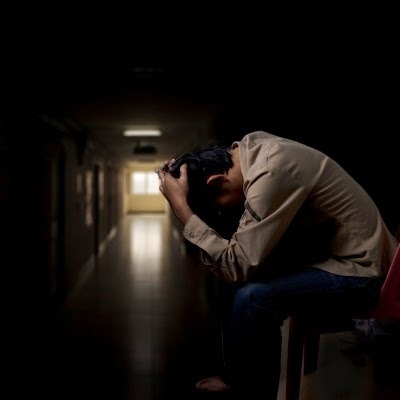 Image courtesy of Naypong / FreeDigitalPhotos.net
Image courtesy of Naypong / FreeDigitalPhotos.net
However, this review got me thinking about men crying (in written fiction, in real life and on TV). The reviewer said nothing of the number of times the female main character cried (which was at least as often--in fact I think it was more). I have to wonder why? Is it part of the general perception that men are expected to be "strong"? I can't really answer that because I don't know what was going on in the reviewers mind when s/he said that it made them roll their eyes every time it mentioned the male crying.
Personally, I find it a sign of strength in a man that he is willing to allow his emotions to show. And you will never be able to convince me that alone, in their darkest moments, men don't feel the same things that women do. That men aren't willing to give themselves over to sorrow when they are grieving. And by grieving I don't necessarily mean the loss of a loved one (although there is that too) but it might be the loss of a relationship, facing the realization that something expected and anticipated isn't going to come to fruition, or even having lost of control over some key aspect of his life. These are all, in my opinion, reasonable reasons for a man to cry.
Yet even with this belief, I have to admit I find it more confronting to watch a man breakdown in tears than to see a woman cry. Although it didn't make me roll my eyes, I did notice when the male character cried much more than I noticed whether the female did. Maybe this is linked to the same societal prejudice against male emotions that could have been part of the reason for reviewer's remarks. Maybe it's more reason why men should cry in fiction--to show that a man who cries isn't automatically a weak man.
What are your thoughts on this issue? Should men be allowed to cry in novels or does it make you roll your eyes too? Or does it depend on the situation? If that's the case, under what circumstances do you think it's okay?
 Image courtesy of Naypong / FreeDigitalPhotos.net
Image courtesy of Naypong / FreeDigitalPhotos.net
Published on April 21, 2014 03:27
April 4, 2014
Magnolia Teaser
Way back when I started this blog, one of my early posts talked about kismet. In that post I mentioned that magnolia flowers play a bit of a role in my book, so I decided this would be a good place to release this small teaser. Follow me on facebook for more teasers and inspiration. If you're on Goodreads, maybe add Through the Fire to your to be read list.
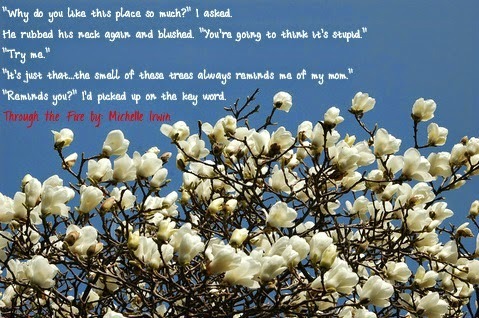

Published on April 04, 2014 03:57
March 25, 2014
Indie Authors Down Under & Cover Reveal
Wow, what a big weekend! It was a great one though.
On Saturday, I headed into Surfers Paradise for the inaugural Indie Authors Down Under event. My publishers Bottom Drawer Publications had a table there with some of their books. Because I was attending, they decided to do an exclusive cover reveal at the event. It was great to hear some very positive feedback about the cover.
The whole event was just a rush: meeting great authors, bloggers, and book lovers; forging new friendships; and just generally having a good time at the VIP after party. Can't wait for next year. Given the opportunity, I will be there will bells on--so watch this space.
So, just going back a step, what cover?
This, shiny, pretty cover:
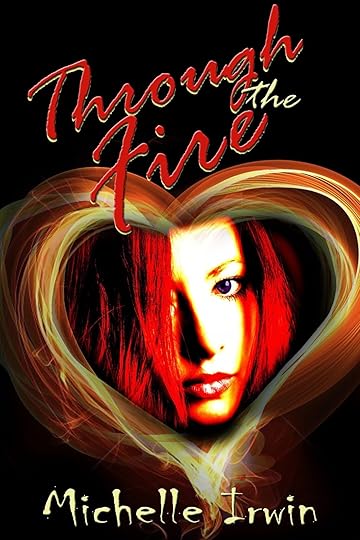
I also have an official blurb:
Evie Meyers’ life is one spent on the run. Every minute of every day, her life is in danger if anyone should suspect the truth about her ancestry. Her father was willing to risk everything to keep the truth hidden, even from her, but the lies he fabricated were exposed when her high school crush, Clay Jacobs, inadvertently stumbled upon her secret. His discovery puts Evie at risk from a secret organization tasked with washing the world clean of nonhumans—and Clay is one of its deadliest soldiers. Forced into a war she doesn’t understand, all because of what she is, Evie is left with no choice but to flee with her father to escape persecution.
When Clay reappears in her life, battle scarred and mysterious, Evie is unprepared and terrified as he forces his way back into her heart. When the battle catches up with her, and a tragic accident tears apart the peace she discovered, she finds herself alone and without the protection of her father, or her lover. Now, she needs to keep her secrets hidden and learn to survive on her own in a world that wants her dead, all while searching for the missing piece of her heart.
And a page on Goodreads.com for the book: https://www.goodreads.com/book/show/21530234-through-the-fire If you like the sound of the book, you can add it to your "Want to Read" list to start sharing the love.
Stay tuned for more details of the release, scheduled for later this year.
On Saturday, I headed into Surfers Paradise for the inaugural Indie Authors Down Under event. My publishers Bottom Drawer Publications had a table there with some of their books. Because I was attending, they decided to do an exclusive cover reveal at the event. It was great to hear some very positive feedback about the cover.
The whole event was just a rush: meeting great authors, bloggers, and book lovers; forging new friendships; and just generally having a good time at the VIP after party. Can't wait for next year. Given the opportunity, I will be there will bells on--so watch this space.
So, just going back a step, what cover?
This, shiny, pretty cover:

I also have an official blurb:
Evie Meyers’ life is one spent on the run. Every minute of every day, her life is in danger if anyone should suspect the truth about her ancestry. Her father was willing to risk everything to keep the truth hidden, even from her, but the lies he fabricated were exposed when her high school crush, Clay Jacobs, inadvertently stumbled upon her secret. His discovery puts Evie at risk from a secret organization tasked with washing the world clean of nonhumans—and Clay is one of its deadliest soldiers. Forced into a war she doesn’t understand, all because of what she is, Evie is left with no choice but to flee with her father to escape persecution.
When Clay reappears in her life, battle scarred and mysterious, Evie is unprepared and terrified as he forces his way back into her heart. When the battle catches up with her, and a tragic accident tears apart the peace she discovered, she finds herself alone and without the protection of her father, or her lover. Now, she needs to keep her secrets hidden and learn to survive on her own in a world that wants her dead, all while searching for the missing piece of her heart.
And a page on Goodreads.com for the book: https://www.goodreads.com/book/show/21530234-through-the-fire If you like the sound of the book, you can add it to your "Want to Read" list to start sharing the love.
Stay tuned for more details of the release, scheduled for later this year.
Published on March 25, 2014 02:29
March 14, 2014
Fear and Loathing in Bris-Vegas
This is a topic I wasn't sure about writing, but I promised to let you all in on my journey toward publishing and, unfortunately, what I'm going to talk about is a big part of those virtual adventures. I'm talking about the biggies: Fear and Self-Doubt.
A week ago, I was in a dark place--writing wise at least. I was looking at the 15,000 words I've written on my 2nd companion book and hated them. Every. Single. One. I wanted nothing more than to push delete and wipe the lot from my computer. In reality, they're not bad words. The need some editing, a bit of polishing and possibly a little more editing again, but they are covering the parts of the story they need to. So why did I hate them so much? Why did I feel such a desire to scrap the lot?
To examine that, we have to go back a bit I guess. I've always been a bit of a sensitive soul, someone easily crushed by criticism and not very willing to accept praise. I have often got in my own way and not pursued dreams or goals because of the fear of failure and encountering unbeatable obstacles (sometimes very real, sometimes imagined). At some point, I've been able to temper this down a little, although I still can't listen to my boss praise me for a job well done without looking away and waiting for the other shoe to drop. I know I'm not alone in this feeling, I don't think there's a single person in the world who hasn't felt like they weren't worthy, or that everything was going to go wrong, at least once in their life.
At no point have I encountered stronger feelings of self-doubt and fear than when I decided that I wanted to be a published author. There are so many steps, each one a potential stumbling block--the potential for failure. Not just in the grander scheme of will my book sell, will the critics hate it, and all of those obvious sort of fears and failures, but in the little ones too. Am I telling the best story I can for my characters? Is this turn of phrase really the best one to use at this point in the story? Worse, there is no instant feedback system. You have to get the story out--or at least a decent-sized chunk of it out--and only then will you hear an external opinion on it. I have to admit, some days are better (easier) than others. Some days, like last week, the fears and doubt grow so debilitating that it's all I can do not to hit delete on everything on my computer and run away to hide.
So, if I have so much fear swirling around, why am I still here, still pursuing my dream? Because I have to.
How am I still here? Because I have a wonderful support network around me. Some of them probably don't even realize I consider them part of that network. I have an incredible pre-reader who, even though we've never met face to face, probably knows me better than most of the people I encounter on a daily basis. I have a husband who helps by picking up the slack on the housework when I have a section that I really need to finish to keep myself from going crazy with the voices in my head. I have a group of family and friends who are just as desperate to have my book in their hands as I am. One day, I also hope to have fans (outside of those family and friends that I've already mentioned) whose voices will help to drown out the negative critiques. Even with all of these things, I know there will be days when I will be convinced that everything I've written is utter trash, but there will be the good days too.
And that's the most important lesson I've learned: it's those good days that make it all worthwhile.

A week ago, I was in a dark place--writing wise at least. I was looking at the 15,000 words I've written on my 2nd companion book and hated them. Every. Single. One. I wanted nothing more than to push delete and wipe the lot from my computer. In reality, they're not bad words. The need some editing, a bit of polishing and possibly a little more editing again, but they are covering the parts of the story they need to. So why did I hate them so much? Why did I feel such a desire to scrap the lot?
To examine that, we have to go back a bit I guess. I've always been a bit of a sensitive soul, someone easily crushed by criticism and not very willing to accept praise. I have often got in my own way and not pursued dreams or goals because of the fear of failure and encountering unbeatable obstacles (sometimes very real, sometimes imagined). At some point, I've been able to temper this down a little, although I still can't listen to my boss praise me for a job well done without looking away and waiting for the other shoe to drop. I know I'm not alone in this feeling, I don't think there's a single person in the world who hasn't felt like they weren't worthy, or that everything was going to go wrong, at least once in their life.
At no point have I encountered stronger feelings of self-doubt and fear than when I decided that I wanted to be a published author. There are so many steps, each one a potential stumbling block--the potential for failure. Not just in the grander scheme of will my book sell, will the critics hate it, and all of those obvious sort of fears and failures, but in the little ones too. Am I telling the best story I can for my characters? Is this turn of phrase really the best one to use at this point in the story? Worse, there is no instant feedback system. You have to get the story out--or at least a decent-sized chunk of it out--and only then will you hear an external opinion on it. I have to admit, some days are better (easier) than others. Some days, like last week, the fears and doubt grow so debilitating that it's all I can do not to hit delete on everything on my computer and run away to hide.
So, if I have so much fear swirling around, why am I still here, still pursuing my dream? Because I have to.
How am I still here? Because I have a wonderful support network around me. Some of them probably don't even realize I consider them part of that network. I have an incredible pre-reader who, even though we've never met face to face, probably knows me better than most of the people I encounter on a daily basis. I have a husband who helps by picking up the slack on the housework when I have a section that I really need to finish to keep myself from going crazy with the voices in my head. I have a group of family and friends who are just as desperate to have my book in their hands as I am. One day, I also hope to have fans (outside of those family and friends that I've already mentioned) whose voices will help to drown out the negative critiques. Even with all of these things, I know there will be days when I will be convinced that everything I've written is utter trash, but there will be the good days too.
And that's the most important lesson I've learned: it's those good days that make it all worthwhile.

Published on March 14, 2014 21:37
February 28, 2014
Falling For You
Happy March! How quickly is this year just disappearing?
Last week, I blogged about book covers which lead to a discussion with a friend on Twitter about how deciding on a book in a bookstore is a bit like falling in love. People who say they don't judge books by their covers is a bit like those who say personality is more important than looks. While I do agree with both of these statements in the long term, I think there needs to be a caveat on them because I believe that there has to be an initial "spark".
When it comes to falling for a person, this spark may not necessarily be ignited by conventional good looks, it could just be an coy smile, intriguing eyes or a . The book cover is this initial attraction, something about the cover calls the attention of the reader. It might be the picture, but it might not. Maybe it's the title. It could even be the author's name--especially if it's an author you've read before and loved.
What happens after that first spark of interest? From there, it is time to start the courting process. When it comes to falling in love, this comes in the form of dates, phone calls or maybe even some not-so-subtle flirting whenever you run into one another. For a book, the courting continues with the back cover copy/blurb. Just like the most attractive person in the world won't hold someone's interest long-term if they're not good to be around, the prettiest cover in the world won't draw someone who hates high fantasy epics to read Lord of the Rings.
Finally comes the long term attraction. In love, this is the "relationship" stage. This can last a few months or a few years, or--if you are really lucky--a lifetime. The mirror of this in the book selection process is the reading of the words and the story contained within. A good story will hold the readers interest to the end. A great one will linger for a while after the book has been finished. Sometimes, if a reader is really lucky, they'll find a book that will stay with them throughout the rest of their life. They'll read that favorite book that can be picked up and read over and over, or that changes their life in some meaningful way.
There are exceptions to this process of course, there are blind dates (and their counterpart in books - recommendations from friends), online dating (Amazon and Goodreads recommendations) and a whole range of other methods of falling in love.
Of course the one good thing about falling in love with books is that you can do it again and again. The old books never get jealous. Even if you leave your old favorite for years, it'll still be there steady and constant as ever when you come back to it. In fact, re-reading it at a different stage in your life can sometimes enhance the richness of the experience.
I have a number of books which I fell hard for, for a number of reasons. Some of these I'll re-read over and over, some I remember fondly and don't want to revisit just in case it changes my perception/memory of the book.
How about you, what are your old faithfuls?
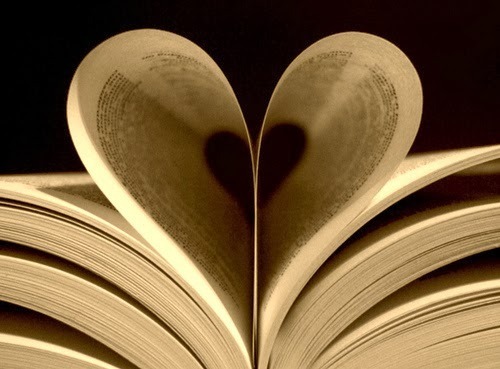
Last week, I blogged about book covers which lead to a discussion with a friend on Twitter about how deciding on a book in a bookstore is a bit like falling in love. People who say they don't judge books by their covers is a bit like those who say personality is more important than looks. While I do agree with both of these statements in the long term, I think there needs to be a caveat on them because I believe that there has to be an initial "spark".
When it comes to falling for a person, this spark may not necessarily be ignited by conventional good looks, it could just be an coy smile, intriguing eyes or a . The book cover is this initial attraction, something about the cover calls the attention of the reader. It might be the picture, but it might not. Maybe it's the title. It could even be the author's name--especially if it's an author you've read before and loved.
What happens after that first spark of interest? From there, it is time to start the courting process. When it comes to falling in love, this comes in the form of dates, phone calls or maybe even some not-so-subtle flirting whenever you run into one another. For a book, the courting continues with the back cover copy/blurb. Just like the most attractive person in the world won't hold someone's interest long-term if they're not good to be around, the prettiest cover in the world won't draw someone who hates high fantasy epics to read Lord of the Rings.
Finally comes the long term attraction. In love, this is the "relationship" stage. This can last a few months or a few years, or--if you are really lucky--a lifetime. The mirror of this in the book selection process is the reading of the words and the story contained within. A good story will hold the readers interest to the end. A great one will linger for a while after the book has been finished. Sometimes, if a reader is really lucky, they'll find a book that will stay with them throughout the rest of their life. They'll read that favorite book that can be picked up and read over and over, or that changes their life in some meaningful way.
There are exceptions to this process of course, there are blind dates (and their counterpart in books - recommendations from friends), online dating (Amazon and Goodreads recommendations) and a whole range of other methods of falling in love.
Of course the one good thing about falling in love with books is that you can do it again and again. The old books never get jealous. Even if you leave your old favorite for years, it'll still be there steady and constant as ever when you come back to it. In fact, re-reading it at a different stage in your life can sometimes enhance the richness of the experience.
I have a number of books which I fell hard for, for a number of reasons. Some of these I'll re-read over and over, some I remember fondly and don't want to revisit just in case it changes my perception/memory of the book.
How about you, what are your old faithfuls?

Published on February 28, 2014 21:20
February 24, 2014
Judging a book by its cover.
Part of the secret squirrel stuff that I've been doing lately is working with my publishers on designing book covers. This is an ongoing process and obviously all will be revealed in due course. All I'll say is, well . . . I'm in love. I hope you will be too once when the time comes for the cover reveal.
Now I have to say that I am in the very fortunate position of having something of a say in the ideas I had for book covers. I guess it's one of the benefits of being with a smaller publishing house, or maybe it's just because my publishers are so wonderful. From what I've heard about with the more traditional publishing houses, they tend to have complete and total control over it unless you're a best-selling author and the first time you see it is as a set in stone final image. As a debut novelist, you can pretty much forget about having a say. Of course, that's purely conjecture based on what I've read on other publishing blogs, so I could be wrong. Regardless, as I said, I'm lucky enough to have some say.
Part of the process has been discussing the character, the book, how to sum up the story with a single image and because it's part of a series, how to carry that image/theme though out the rest of the series. It got me thinking about a blog post. What makes a good cover?
For me, a good book cover should convey the mood of the story. If the front cover is all rainbows and puppies, I'm not going to be expecting to see angst within the pages. The opposite is true, a dark and depressing cover on the front of a comedy just doesn't work, unless of course it's a dark comedy. One example of great covers which perfectly convey the tone of the books are the Discworld series by Terry Pratchett. For the UK and Australian books the bright illustrations that wraparound the covers are fun and silly, and hint at the silliness that will be contained between the pages.
Do you ever judge books by their covers? Have you seen a cover and not read the contents? Conversely, have you found a great cover and the book just hasn't lived up to the expectation? I have to say I probably have done both.


Now I have to say that I am in the very fortunate position of having something of a say in the ideas I had for book covers. I guess it's one of the benefits of being with a smaller publishing house, or maybe it's just because my publishers are so wonderful. From what I've heard about with the more traditional publishing houses, they tend to have complete and total control over it unless you're a best-selling author and the first time you see it is as a set in stone final image. As a debut novelist, you can pretty much forget about having a say. Of course, that's purely conjecture based on what I've read on other publishing blogs, so I could be wrong. Regardless, as I said, I'm lucky enough to have some say.
Part of the process has been discussing the character, the book, how to sum up the story with a single image and because it's part of a series, how to carry that image/theme though out the rest of the series. It got me thinking about a blog post. What makes a good cover?
For me, a good book cover should convey the mood of the story. If the front cover is all rainbows and puppies, I'm not going to be expecting to see angst within the pages. The opposite is true, a dark and depressing cover on the front of a comedy just doesn't work, unless of course it's a dark comedy. One example of great covers which perfectly convey the tone of the books are the Discworld series by Terry Pratchett. For the UK and Australian books the bright illustrations that wraparound the covers are fun and silly, and hint at the silliness that will be contained between the pages.
Do you ever judge books by their covers? Have you seen a cover and not read the contents? Conversely, have you found a great cover and the book just hasn't lived up to the expectation? I have to say I probably have done both.


Published on February 24, 2014 03:01
February 16, 2014
Why do I write?
I've seen a few people in various online writing groups recently ask the question, "Why do you write?" and it got me thinking about my reasons.
This is both the easiest and hardest question in the world to answer. The truth of the matter is, I write because I have to. That's why the question is easy, but also why it's hard. To someone who doesn't have this same urge, it's hard to explain exactly what it is that makes me need to write.
If I had to, I could probably go a week, maybe two at the outside, without adding words to a story, but after that it starts to become harder. I have a compulsion to write the same way some people might be compelled to watch their favorite TV show.
So, why do I write? You could probably select any of the why-I-write.tumblr.com images at random and I'd be able to sympathize. Let's have a look at just a couple:
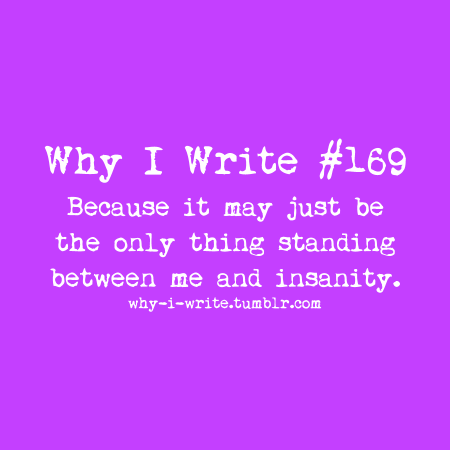
For me, personally, writing is cathartic. It helps to relieve stress or to celebrate a win. If I have a busy day at work, there's nothing better than coming home, switching off and letting the characters take control. If something great happens, after celebrating with my family and friends, I want to celebrate with my characters.
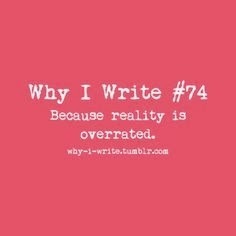
I've always loved the idea of walking in someone else's shoes though, when I was younger this was expressed through a love of the stage (both dance and drama) where with a simple costume and a different choice of words, you could be transformed into another person. I guess for me, writing is very similar. I can imagine this person who is my character and follow the way they handle a situation. As I've probably mentioned before, this is often not the way I would handle it, but there's something fun about seeing someone react in a way you would never expect.
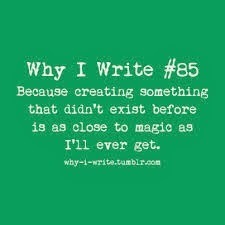
There is probably a selfish part of me too that wants to leave a mark on this world. In my day job, I am important day by day, but would anyone really remember me in ten years time? Twenty? Will what I do now have any impact on the next generation at all? I have my family and friends, and I know that they'll always hold me in their hearts, as I hold them in mine, but if I look deep enough inside, I'm certain there is a part that wants to write something that will endure into the future.
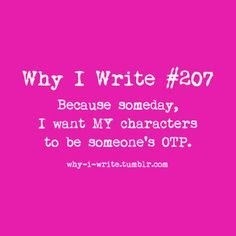
What's the biggest goal I have for my writing? Besides getting a shiny, physical book with my name on it (which is ultimately my biggest goal) it would have to be connecting with the reader and making them feel something for the characters who I've become so intimately familiar with. I long for the sort of dynamic where readers will argue passionately for and against choices my characters made, where they will want to know, "what happens next." For people to care.
How about you? What is your compulsion; the one thing you can't live without doing? If you're a writer, why do you write?
This is both the easiest and hardest question in the world to answer. The truth of the matter is, I write because I have to. That's why the question is easy, but also why it's hard. To someone who doesn't have this same urge, it's hard to explain exactly what it is that makes me need to write.
If I had to, I could probably go a week, maybe two at the outside, without adding words to a story, but after that it starts to become harder. I have a compulsion to write the same way some people might be compelled to watch their favorite TV show.
So, why do I write? You could probably select any of the why-I-write.tumblr.com images at random and I'd be able to sympathize. Let's have a look at just a couple:

For me, personally, writing is cathartic. It helps to relieve stress or to celebrate a win. If I have a busy day at work, there's nothing better than coming home, switching off and letting the characters take control. If something great happens, after celebrating with my family and friends, I want to celebrate with my characters.

I've always loved the idea of walking in someone else's shoes though, when I was younger this was expressed through a love of the stage (both dance and drama) where with a simple costume and a different choice of words, you could be transformed into another person. I guess for me, writing is very similar. I can imagine this person who is my character and follow the way they handle a situation. As I've probably mentioned before, this is often not the way I would handle it, but there's something fun about seeing someone react in a way you would never expect.

There is probably a selfish part of me too that wants to leave a mark on this world. In my day job, I am important day by day, but would anyone really remember me in ten years time? Twenty? Will what I do now have any impact on the next generation at all? I have my family and friends, and I know that they'll always hold me in their hearts, as I hold them in mine, but if I look deep enough inside, I'm certain there is a part that wants to write something that will endure into the future.

What's the biggest goal I have for my writing? Besides getting a shiny, physical book with my name on it (which is ultimately my biggest goal) it would have to be connecting with the reader and making them feel something for the characters who I've become so intimately familiar with. I long for the sort of dynamic where readers will argue passionately for and against choices my characters made, where they will want to know, "what happens next." For people to care.
How about you? What is your compulsion; the one thing you can't live without doing? If you're a writer, why do you write?
Published on February 16, 2014 02:40
February 7, 2014
Secret Squirrel!
There is so much secret squirrel, but super exciting, stuff going on for me at the moment. I will reveal all when the time comes, hopefully in the next month or two.
In the meantime, can I just say how hard it is for me to keep a secret? LOL
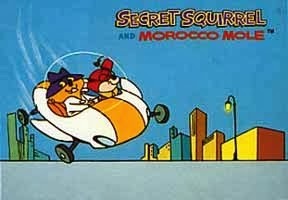
In the meantime, can I just say how hard it is for me to keep a secret? LOL

Published on February 07, 2014 15:29
February 3, 2014
What's your point of view?
I've seen a few posts around on different blogs talking about whether a story should be in first person (I, me, etc) or third person (he, she, etc). This blog post isn't really about that. If I was pressed for advice on this, I would say write the story in whichever perspective best suits the story, and only very, very rarely should that be second person (you, your). I currently have a work in progress that's written in 3rd person. The novel that's being edited by publishers at the moment is in first. Why are they different? Because that's how the different characters spoke to me.
What my post today is really about writing alternative points of view (POV) of stories. This is often a great technique to help shake writer's block because you're forced to consider options which might not seem obvious if you're writing the story in the main characters POV. What prompted me to write this blog post is that I have been doing this lately, in fact I've been doing it enough that I think I might end up with another 2 books set in the same world as my series, just from a different character's perspective. Now generally, I'm not a big fan of retelling a story from another side for one primary reason: most, if not all, of the emotions of the secondary characters POV *should* shine through in the original story. The main character might not be able to see/understand the other character's motivations or emotions, but the reader sure as sugar should.
Why then, am I writing books that are a retelling of events from the other side? Well, because I'm not. Not really anyway. The characters each have their owns lives, their own experiences and don't spend every moment together. There is, naturally, some crossover, but the two main characters have separate and distinct stories to tell. Hopefully, when the time comes, you'll enjoy them both.
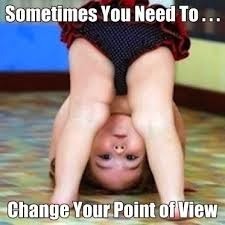
What my post today is really about writing alternative points of view (POV) of stories. This is often a great technique to help shake writer's block because you're forced to consider options which might not seem obvious if you're writing the story in the main characters POV. What prompted me to write this blog post is that I have been doing this lately, in fact I've been doing it enough that I think I might end up with another 2 books set in the same world as my series, just from a different character's perspective. Now generally, I'm not a big fan of retelling a story from another side for one primary reason: most, if not all, of the emotions of the secondary characters POV *should* shine through in the original story. The main character might not be able to see/understand the other character's motivations or emotions, but the reader sure as sugar should.
Why then, am I writing books that are a retelling of events from the other side? Well, because I'm not. Not really anyway. The characters each have their owns lives, their own experiences and don't spend every moment together. There is, naturally, some crossover, but the two main characters have separate and distinct stories to tell. Hopefully, when the time comes, you'll enjoy them both.

Published on February 03, 2014 01:51
Write On Shell
My random thoughts as I take the first tentative steps into the world of a published author.
- Michelle Irwin's profile
- 437 followers



